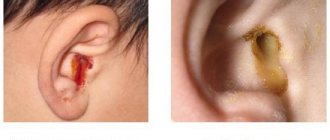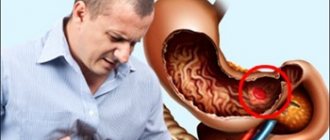16 900
30 000
Intimate plastic surgery with a 43% discount
Medline-Service offers intimate plastic surgery of the labia majora or minora for 16,900 rubles. instead of 30,000 rub.
Terms and prices
17 000
26 440
“Happy Parents” program with a 35% discount
"Medline-Service" offers the "Happy Parents" program with a 35% discount
Terms and prices
95 000
118 970
Prenatal care program “Standard +”
“Medline-Service” offers the “Standard +” prenatal care program (pregnancy management) for 95,000 rubles. instead of 118,970 rub.
Terms and prices
66 000
83 180
Prenatal care program "Standard"
“Medline-Service” offers the “Standard” prenatal care program (pregnancy management) for 66,000 rubles. instead of 83,180 rub.
Terms and prices
5 500
8 820
Express diagnostics – Check-UP “Women’s health” with a 35% discount
"Medline-Service" offers express diagnostics - Check-UP "Women's Health" with a 35% discount
Terms and prices
A strong odor of urine in women may occur due to poor hygiene. But sometimes illness can cause an unpleasant odor. If the symptom does not go away, you should consult a doctor and get tested. With diseases such as diabetes, inflammation and infections of the genitourinary system, urine may smell of ammonia.
Acetonuria
This is a pathological condition that develops if the kidneys and lungs do not have time to remove the ketone cells entering the body. Acetone is a product of the breakdown of protein and fat in the human body. It is a toxic ketone substance, the high content of which in urine may indicate pathology of internal organs. Acetonuria must be treated, otherwise the following consequences may occur:
- damage to the brain and central nervous system;
- dehydration;
- low blood pH level;
- liver disease;
- heart and respiratory problems;
- mental disorder;
- inflammation of the mucous membrane of the stomach and intestines.
- coma (in severe cases).
Composition of sweat [edit | edit code]
The composition and volume of sweat fluid can vary within very wide limits depending on environmental conditions.
On average, at room temperature a person secretes 400-600 ml of sweat per day [ source not specified 86 days
] . In hot weather, as well as due to heavy physical labor, 1-2 liters may be released. sweat per hour [3] (some athletes up to 5 liters).
Sweat also contains other [ clarify
] products of mineral metabolism, sulfuric acid compounds, phosphates, potassium chloride, calcium salts, as well as products of protein metabolism: urea, lactic acid, uric acid, ammonia, some amino acids. Sweat contains volatile fatty acids. The sweat reaction is acidic: pH 3.8-6.2. The acidic reaction of sweat contributes to the bactericidal properties of the skin.
Pathological causes of ammonia odor in urine
If your urine smells like acetone, this may indicate various diseases.
Diabetes mellitus is the most common cause of strong, foul-smelling urine. This is due to the fact that with this disease the body lacks glucose, which is responsible for the functioning of all cells. Type 1 diabetes is characterized by a lack of insulin, which helps glucose move through the blood vessels. In the second type, the body has enough insulin, but it is not absorbed by the cells. As a result, the body uses acetone to force glucose into cells. But it has a toxic effect on the body, and in diabetes it can even cause coma. Therefore, if you experience severe thirst, abdominal pain, or vomiting, you should immediately consult a doctor.
Inflammation of the urinary system. This reason is also very common. The kidneys play a major role in eliminating ketone bodies from the body. Therefore, a malfunction in their work can cause the accumulation of ketone bodies in the body and aggravate acetonuria.
Diseases of the urinary system develop due to the development of pathogenic microflora.
The urine begins to smell strong much earlier than other signs of illness appear. Therefore, you should pay attention to this symptom in order to identify the disease as early as possible and successfully treat it at the initial stage, without possible complications.
Diseases of the urinary system develop due to the proliferation of pathogenic microflora.
Foul odor of urine may indicate the following diseases:
- Pyelonephritis – accompanied by lower back pain, high fever and pain when urinating. The disease is caused by Escherichia coli. This disease affects the tubular system of the kidneys.
- Urethritis is an infectious disease that is sexually transmitted. Accompanied by inflammation of the urinary canal and an unpleasant odor of urine.
- Cystitis. This disease may be a consequence or cause of pyelonephritis. It can be provoked by Pseudomonas aeruginosa and Escherichia coli, chlamydia, and streptococci. Cystitis can also be caused by hypothermia, poor nutrition, and poor hygiene. Symptoms of the disease are frequent urination with painful sensations and a constant feeling of fullness of the bladder.
- Pyelitis. This disease affects the renal pelvis. A characteristic feature of pyelitis is the presence of pus in the urine.
- Liver diseases. This organ is responsible for normal metabolism. It produces enzymes for metabolism. If the liver works abnormally, metabolic processes are disrupted, and as a result, the smell of ammonia appears in the urine.
- Infectious diseases. An increased level of acetone may be associated with the presence of infections such as influenza, scarlet fever, E. coli and others. In this case, the cause is an increase in the number of ketone cells, as a consequence of protein breakdown and severe dehydration of the body.
- Infections of the reproductive system. The cause of odor in the urine in women may be diseases of the reproductive system. In this case, you need to contact a venereologist and undergo the necessary tests. An unpleasant odor often appears a short time after unprotected intercourse. Most often it is caused by the following infections:
- Chlamydia. The smell of chlamydia appears 1-2 weeks after infection. The woman also feels pain in the lower abdomen, spotting appears during the intermenstrual period, and painful urination;
- Ureoplasmosis. This disease most often affects men, but with weak immunity, women also become infected with it. The infection affects the genitals, bladder and urethra, and causes unpleasant odor in the urine.
- Mycoplasmosis – causes inflammation of the genital organs and kidneys, provokes the development of bacterial vaginosis. The infection is accompanied by the discharge of mucus from the vagina with a strong unpleasant odor;
- Trichomoniasis. This disease causes inflammation of the genital organs: uterus, vagina, urethra. Foamy discharge with an unpleasant odor also appears.
- Vaginitis. It develops due to the spread of pathogenic microflora of a bacterial or fungal nature. Discharge with the smell of ammonia in women is characteristic of this disease. Bacteria and fungal infections are the causes of vaginitis. Other symptoms of vaginitis include cloudy, dark-colored discharge and urine, possibly with sediment.
- Stenosis of the digestive system. This is a serious disease in which the esophagus sharply narrows. Symptoms of stenosis are: difficulty swallowing, increased production of saliva, vomiting. If such signs are present, you should urgently contact a gastroenterologist.
- Malignant tumors. They can be of different etiologies and localizations. With such serious diseases, in addition to the unpleasant smell of urine, the following symptoms appear: lack of appetite, and, as a result, weight loss, weakness. Also, if a person has chronic diseases, they sharply worsen.
- Hyperthyroidism is a thyroid disease that causes excessive production of acetone in the human body. Signs of the disease are:
- Unpleasant urine odor in women;
- Increased sweat production;
- Cardiopalmus;
- Constant temperature;
- Feeling of fatigue in the muscles, even tremors of the limbs;
- Nervous tension, aggression, anxiety;
- Sudden weight loss with normal nutrition;
- Gray hair at a young age.
Hyperthyroidism is very dangerous and can even lead to death. An urgent visit to an endocrinologist for such symptoms is mandatory.
Unbalanced diets that lead to dehydration can cause acetonuria. Fasting is especially dangerous, as it can cause an increase in acetone in the body. The body, not receiving the necessary substances, including glucose, begins to consume liver and muscle glycogenesis. When these reserves run out, the breakdown of proteins and fats from the body's reserves occurs. The result is the formation of ketone cells and the smell of acetone in the urine. With prolonged fasting, its level in the body can reach a critical point. Acetone is excreted through urine, sweat and saliva. Therefore, during fasting, not only does the urine smell like ammonia in women, but there is also an unpleasant odor from the skin and breath.
The Dukan Diet is based on eating a lot of protein, making it easy to follow without feeling too hungry. But the body cannot fully process such an amount of protein. The kidneys and liver cannot cope with this, and the level of acetone in the body increases. The same effect occurs when there is an excess of fat in the body. If the smell of urine has changed after following a diet or fasting, you need to stop eating and start eating normally. Otherwise, more serious consequences may occur. A balanced diet is the ratio of proteins, fats and carbohydrates in the ratio 1:1:4.
Diagnostic methods
At the initial stages of the examination, the following studies are carried out:
- general urine analysis;
- urine analysis according to Nechiporenko;
- general blood analysis;
- blood containing glucose;
- examination by a gynecologist and urologist;
- a smear of discharge from the urethra and cervix;
- Ultrasound of the urinary system, pelvic organs.
If this is not enough, the examination will be expanded:
- The gynecologist will refer you for PCR diagnostics to exclude STDs, HPV, and bacterial culture of urethral and vaginal discharge.
- The urologist will prescribe a bacterial urine culture, MRI or CT scan if the tumor nature of the disease is suspected.
- A coloproctologist or surgeon will write out a referral for a colonoscopy, endoscopic examination of the intestines;
- The oncologist will notify you of the need to take a biopsy if neoplasms are detected on ultrasound or MRI, regardless of the expected origin.
Physiological reasons
There may be physiological reasons for foul-smelling urine. These include:
- Climax. During this period, changes occur in the female body, the production of the hormone estrogen, which is responsible for reproductive function and resistance to infections, decreases.
- Long-term intake of vitamins and dietary supplements. Some of them give urine the smell of acetone. This is especially true for B vitamins.
- Dehydration. The cause may be vomiting, indigestion, or increased sweating. Lack of moisture in the body causes slagging of the urinary organs. Therefore, the natural process of urine formation is disrupted. A healthy person excretes one and a half liters of water per day. You need to drink the same amount of liquid. If there is not enough fluid, the urine becomes highly concentrated with a specific odor.
- Prolonged urinary retention. If the bladder has not been emptied for a long time, the urine may change in odor. The longer the delay, the stronger the smell. Frequently holding back urine can cause various diseases of the urinary system.
- During menstruation, urine may also change odor. This occurs due to changes in hormonal levels and microflora.
- Long-term and uncontrolled use of medications can cause disruption of metabolic processes in the body and, as a result, an ammonia-like odor of urine may appear. This often occurs with an excess of calcium and iron in the body, as well as the use of antibiotics.
- Gives smell to urine and food. This is especially true for spicy, fatty and salty dishes. Alcohol, soda water, asparagus and garlic also have an effect.
Special attention should be paid to athletes who intensively build muscle in the gym. They spend a lot of energy and replenish it irrationally. Their urine smell may change due to eating a large amount of protein foods and a lack of carbohydrates.
Certain foods
Why does urine smell - strong, pungent, unpleasant? The reason may lie in your recent lunch or dinner.
- Spices (particularly garlic) that emit a strong aroma. These seasonings can also give urine a distinct odor.
- Seafood. Especially if you have eaten them in large quantities. The statement applies most of all to mussels - both fresh and marinated.
- The most common food cause of strong urine odor is asparagus. No matter what form you use this plant, it will cause a sharp, unpleasant odor in your discharge. However, this kind of deficiency can be easily eliminated - add a little sea salt to the dish with asparagus before eating.
Other reasons
If the above diseases could not be identified, and the urine smells strongly, the reason may be different:
- Heavy physical activity;
- Injuries involving damage to the central nervous system;
- Alcohol or chemical intoxication;
- Use of anesthesia.
To normalize acetone levels, you simply need to eliminate these factors.
Dehydration
Why does urine smell? The pronounced ammonia smell of urine is a rather alarming sign. It may indicate total dehydration of the body! The reason is that water imbalance makes the urine more concentrated than normal.
Dehydration is not always caused by a critical situation or serious illness. It can even affect a completely healthy person. If we are carried away by work or other occupation (and even more so physically), on a hot and stuffy day we forget to drink the required amount of water. Let us remind you that the minimum norm for a person per day is 1.5 liters.
Excess acetone during pregnancy
If the urine smells like ammonia in a pregnant woman, this is a serious reason to sound the alarm. After all, it poisons not only the adult body, but also the child. Excess acetone often causes gestational diabetes, which can progress to diabetes mellitus. This is a danger for both mother and child.
Signs of the presence of acetone in a pregnant woman:
- General weakness, drowsiness.
- Frequent dizziness.
- Nausea.
These symptoms often occur in pregnant women, but it is still better to get tested for the presence of ketone bodies. If they are identified, treatment under the supervision of a doctor will be required.
A common cause of increased acetone in the urine is toxicosis, which leads to dehydration and nutrient deficiency. But a pregnant woman is not immune from all of the above reasons. Therefore, to clarify the diagnosis, it is necessary to undergo a thorough examination.
Reviews
Dear readers, your opinion is very important to us - therefore, we will be glad to receive feedback about sweat that smells like urine in the comments, this will also be useful to other users of the site.
Natalia:
“In the evening the child begins to smell of ammonia, and at night the smell of urine appears. It stinks so much you can't walk past it. I consulted with experts on the Internet, they write that it could be diabetes mellitus or kidney failure. We need to donate blood, check urea and creatinine. And also check the urine for the amount of protein.”
Catherine:
“My son periodically develops sweat with the smell of urine. Doctors said it was from excess protein. I noticed that this happens after eating meat. I didn’t give it for a long time, everything was fine, we tried again, the situation repeated itself. Apparently, he should be a vegetarian."
Treatment of acetonuria in pregnant women
General principles of treatment include the following procedures:
- Saturation of the body with water. To do this, be sure to drink plenty of fluids. If, due to toxicosis, water is not retained in the body, medicinal solutions such as rehydron or gastrolit are prescribed. They restore the body's water balance. They need to be taken frequently - 1 tsp every 5-10 minutes.
- Therapeutic diet: vegetables, boiled lean meat, low-fat cottage cheese, fruits, especially apples.
- Drugs that remove toxins, such as activated carbon, enterosgel.
- To maintain the level of vitamins and glucose in the body of a pregnant woman, droppers with vitamins and glucose are used.
Such measures are effective if there is no serious disease that causes an increase in acetone in the body. If present, parallel treatment is carried out.
Sweating function [edit | edit code]
When exposed to high ambient temperatures, the reflex occurs due to irritation of skin receptors that perceive heat.
Sweat glands are involved in regulating body temperature. It takes 2436 kJ to evaporate one liter of sweat, causing the body to cool down. At low ambient temperatures, sweating decreases sharply. When the air is saturated with water vapor, the evaporation of water from the surface of the skin stops. Therefore, staying in a hot, damp room is poorly tolerated.
How to take tests for acetone correctly
If a pregnant woman smells acetone in her urine or breath, she should definitely get tested. The night before you should not eat fatty or salty foods. Otherwise, the result may be erroneous. It is possible to carry out analysis at home. You can buy a special test for this at the pharmacy. To carry out the analysis, you need to collect your morning urine and put the test in it. It should change color. If the strip turns pink - the acetone level is normal, purple - the level is increased, you need to consult a doctor.
After 2-3 days, it is recommended to do a repeat test; the urine may return to normal.
But if the urine smells like acetone for a long time, a more serious examination with hospitalization will be required.
Prevention - when to go to the urologist?
When you smell unusual urine odor, don't panic. In most cases, this is the aforementioned result of a special diet or a lower tolerance to foods containing, for example, high concentrations of sulfur. However, if you want to be sure that everything is fine with us, you should take a urine test. This is one of the main diagnostic tests, which, despite its simplicity, answers many questions related to the functioning of the urinary system, mainly the kidneys.
Through examination, the physician can quickly determine whether the morphotic components of the sediment include, for example, leukocytes or erythrocytes. This test detects dangerous bacteria, fungi and mucus with great confidence.
ONLINE REGISTRATION at the DIANA clinic
You can sign up by calling the toll-free phone number 8-800-707-15-60 or filling out the contact form. In this case, we will contact you ourselves.
If you find an error, please select a piece of text and press Ctrl+Enter
Correct treatment
Treatment for excess acentone in urine includes:
- Cleansing enemas that help remove toxins from the body. Enterosorbents are used for the same purposes.
- Infusion solution or diluted glucose solution (for pregnant women);
- Drinking alkaline mineral water. Oral dehydration solutions such as chlorazone and rehydron are also very useful.
If, after taking tests, the cause cannot be found, you need to follow a diet, avoid drinking alcohol and nicotine, carefully maintain hygiene and move more.
Starvation
The consequence of fasting is acidosis with all the sad consequences that flow from it. The human body needs a certain amount of carbohydrates every day. When there is a shortage, the deficiency begins to be compensated from preliminary reserves of fatty acids.
Hypoglycemia (insufficient blood glucose) develops. The blood mass becomes acidic, which leads to acidosis. The consequence is that ketone bodies are excreted in the urine. They will give the urine a strong smell of acetone.









